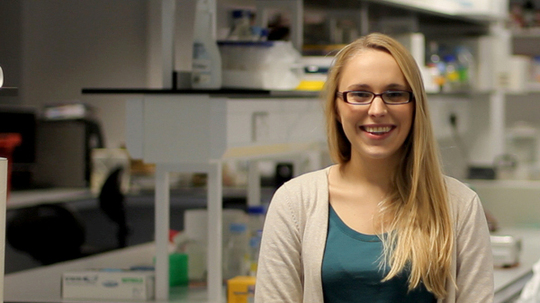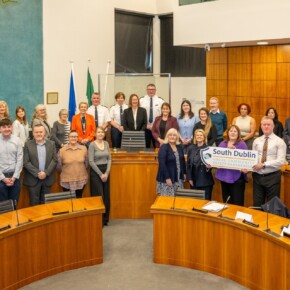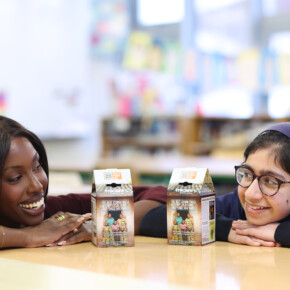Rathfarnham scholar investigates cancer’s ‘sweet tooth’
Dublin People 04 May 2013
THE Irish Cancer Society has announced that it is providing
?¬116,000 in funding for a new research study that investigates the reasons behind breast cancer’s
‘sweet tooth.’
The society is currently funding a total of six studies on breast cancer to a value of more than
?¬834,000 to improve diagnosis and treatments.
For the last 18 months Irish Cancer Society Research SchÂolar, Claire Fergus, from Rathfarnham, has been working on the pioneering research project that looks at why cancer cells consume large volumes of sugar, grow rapidly and become increasingly resistant against medication.
The study investigates the effect a molecule called
‘queuine’ is having on cancerous cells. All cells in the human body contain queuine, which is created by bacteria in the food we eat, but very little is known about its exact function.
Research has shown that queuine levels in cancerous cells drop dramatically, allowing the cells to consume a significant volume of sugar and other foods in order to strengthen and grow at a very fast rate.
Claire’s research looks at how the presence of queuine can have an impact on how cancerous cells consume sugar.
Studies have shown that, as cancer progresses, queuine levels decrease significantly, while cancer cells consume large volumes of sugar, grow rapidly and become increasingly resistant to cancer medication.
The research project is being carried out by Claire at the School of Biochemistry & Immunology in the new Trinity Biomedical Sciences Institute, under the supervision of Dr Vincent Kelly, Head of the Research Group
Claire said:
“A key focus of the study is to determine how and at what stage queuine is being lost, and how this is impacting on sugar consumption.
“There is a lot of research available in relation to breast cancer, so we are starting with a clear view of how the cancer cells behave at different stages. We hope that by understanding the function of queuine we can use it to improve the effectiveness of the drugs currently being used to treat breast cancer. As queuine loss occurs in every type of cancer, the findings could in fact have implications for all cancer patients.
?
Professor John Fitzpatrick, Head of Research at the Irish Cancer Society, said:
“One in every 10 women in Ireland will develop breast cancer during their lifetime, so our funding for breast cancer research is crucial. Having a better understanding of the disease is a key part of improving treatment and outcomes for patients, so studies such as Claire’s play an important role in improving the lives of those affected by cancer.
?
The Irish Cancer Society has contributed more than
?¬30 million to cancer research since 1963. During that period, more than 650 important research findings have been made, many in the area of breast cancer.
The Irish Cancer Society is Ireland’s national cancer charity that is committed to driving the agenda for research through their substantial comÂmÂÂitÂÂment and investment in cancer research.
In 2013, the society intends to commit a significant sum of more than e3.5million in new research, making them the largest voluntary funder of cancer research in Ireland.
This funding is in addition to the e30 million the society has contributed to cancer research since 1963.
The society is also committed to the next generation of cancer researchers in Ireland.
Each year, the Irish Cancer Society hosts a Research Awards Ceremony that recognises and awards new funding to young and enthusiastic scientists, doctors, and other researchers who will lead the way in cancer research in Ireland in the future.
The Irish Cancer Society is reliant on donations from the general public to fulfill their vision of a future without cancer.
For further information on the Irish Cancer Society’s Research Programme or to make a donation, visit www.cancer.ie
To contact the Irish Cancer Society’s National Cancer Helpline freefone 1800200700.











